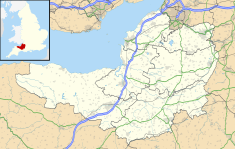The Church of St John the Baptist is an Anglican parish church in Hinton Charterhouse, Somerset, England. It was built in the 12th century and designated a Grade II* listed building.[1]
| Church of St John the Baptist | |
|---|---|
 | |
| Location | Hinton Charterhouse, Somerset, England |
| Coordinates | 51°19′24″N 2°19′19″W / 51.32333°N 2.32194°W |
| Built | 12th century |
Listed Building – Grade II* | |
| Designated | 1 February 1956[1] |
| Reference no. | 1136127 |
The church pre-dates the former Carthusian Hinton Priory in the village from 1232.[2] The priory was founded in 1232 by Ela, Countess of Salisbury,[3] and the prior had the right to tithes from the village following a dispute[4] and to appoint the vicar of the church until the Dissolution of the Monasteries in 1539.[5]
During the 13th century, the south chapel and porch were added to the original 12th-century building. Restoration of the three-stage tower occurred in 1770, and there was further restoration in the 19th century.
The parish is part of the benefice of Freshford, Limpley Stoke, and Hinton Charterhouse within the archdeaconry of Bath.[6]
See also
editReferences
edit- ^ a b Historic England. "Church of St John the Baptist (1136127)". National Heritage List for England. Retrieved 15 September 2013.
- ^ "The chapter house". historicengland.org.uk. Retrieved 20 November 2006.
- ^ Scott, Shane (1995). The hidden places of Somerset. Aldermaston: Travel Publishing Ltd. pp. 18–19. ISBN 1-902007-01-8.
- ^ William Page, ed. (1911). "Houses of Carthusian monks: The priory of Hinton". A History of the County of Somerset: Volume 2. Institute of Historical Research. Retrieved 23 September 2013.
- ^ "St John's Church History". Hinton Charterhouse. Retrieved 23 September 2013.
- ^ "St John the Baptist, Hinton Charterhouse". A church near you. Church of England. Retrieved 23 September 2013.
